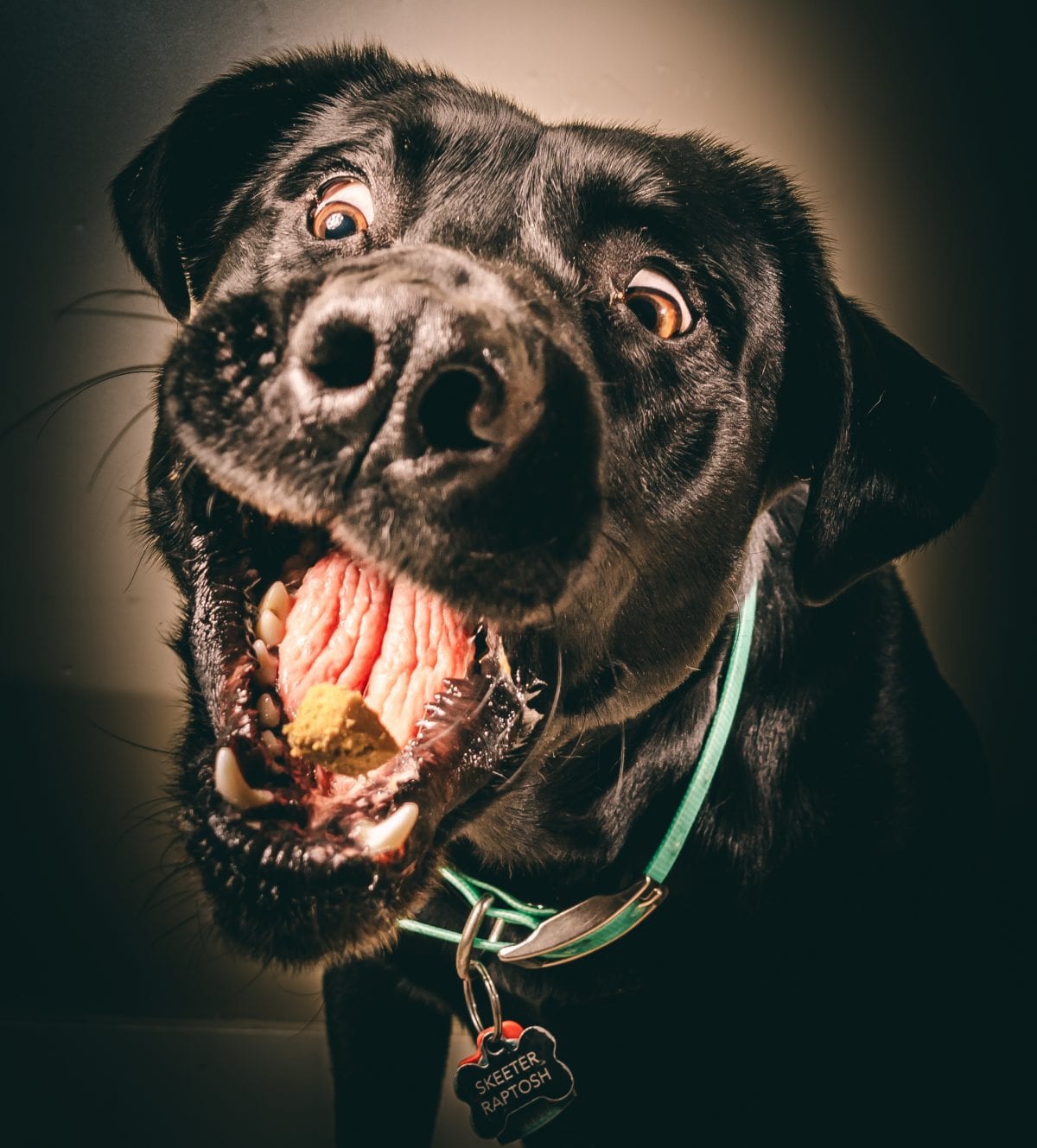Whether you’re a strictly ‘no human food’ dog parent, or someone who likes to share everything with their furry friend, it’s always good to know which foods are a real no-no, just in case. Keep reading to discover some of the most common items that don’t make suitable dog treats.
Almost everyone with a dog will slip them a sneaky morsel of their food from time to time. And if you don’t, there’s still a chance they’ll find an abandoned sandwich while out on a walk! Don’t get caught out – read our list of toxic everyday foods so you know what to look out for.
If you think your faithful friend has eaten something on this list, take them to the vet straight away (even if you think they’ve only had a tiny piece). Don’t wait for symptoms to show – it’s always better to be safe than sorry where your pupper is concerned!
Remember, your furry friend is completely unique – he may be more or less sensitive to these items than other dogs. If a friend says “Don’t worry, my dog eats that all the time”, you should still visit the vet, just in case.
So, what’s on this list? You might be in for a surprise…
Chocolate
Yes, everyone knows that chocolate is toxic to doggos! But did you know that some types are worse than others? The darker the chocolate, the higher the cocoa content – and the worse it is for your canine companion. That said, even white chocolate contains a small amount of theobromine, which is the bit that makes doggos poorly. If you can’t bear the thought of your little friend missing out, try some dog chocolate treats instead.
Onions (plus chives and leeks)
Onion is a sneaky one, because it can appear in all kinds of food, particularly as a powder. For example, your gravy granules or stock mixture probably contain onion powder, which rules out a doggy roast dinner and many other dishes! Lots of crisps, ready meals and even some sausages might also have onion in, so be extra careful – just get the canine version if you’re unsure.
Now for the technical part! Onions contain disulfides and thiosulphates, and can cause damage to the red blood cells – which are very important for keeping your fluffy friend healthy. The damage can also build up over time, so a little bit of gravy at the weekend may seem fine, but in the long run it could be dangerous. Keep reading for more on the signs and symptoms that your doggo may be a secret snacker!
Garlic
Garlic is also part of the onion family and contains thiosulphates, so can cause similar illness. However, some places sell ‘garlic tablets for dogs’ as a health supplement. So, what’s the truth?
The truth is that it’s hard to estimate how much garlic is damaging to dogs, and to prove whether or not it also has health benefits. Research has shown varying results, so it’s best not to risk it. And besides, that means more snacks for you! Just be sure to look out for garlic hidden away in ingredients lists like onion is.
Avocado
Not that most discerning pooches would want to eat avocado, but it contains persin (a toxic chemical) throughout the whole plant (even the leaves and stem), so it’s one to avoid in all its forms. Persin is particularly nasty, so don’t delay in getting to the vet if your pooch has helped himself to some of your smashed avo on toast.
Grapes and raisins
This one seems to surprise people, but it’s true! Not only are grapes and raisins exceptionally toxic to doggos, no one seems to know which chemicals they contain that has this effect. It’s important to get your fluffy friend seen by a vet immediately if they have eaten anything containing grapes or raisins. Again, every dog is different so they may not be affected, but if they are then time is of the essence.
Alcohol and caffeine
Not that we would recommend pouring your canine companion a G&T anyway, but alcohol is also very bad for doggos! And it can be found in much more than just drinks, too. Keep an eye on syrups, raw bread dough and sweeties for this one.
Similarly, caffeine can make dogs poorly too. It’s found in tea, coffee, energy drinks and even diet pills. So if you think your cheeky chappie might swipe old tea bags from the countertop, make sure you (and any guests) don’t leave them within reach.
Xylitol (in peanut butter and sweetened foods)
Before you think “That’s okay, I don’t eat that!”, check your ingredient list again! This one can sneak into all sorts, and now that ‘low sugar’ is a big thing this natural sweetener – a sugar alcohol – is becoming increasingly popular.
Nuts
Not all nuts are toxic to dogs, but some are. For example, macadamia nuts and black walnuts are particularly bad, whereas some people include (unsalted) cashews and peanuts in their dog’s diet. However, they are very high in fat, so it’s best to avoid them altogether.
What about meat? Cooked or raw?
This is a question for your vet, as opinions vary! While raw feeding can be good for many dogs, you need to choose the right meat, balance the diet and ensure the food has been stored and processed safely to avoid infections and parasites (ew!).
That said, cooked meat with bones in is a definite no-no! Cooking bones makes them brittle, so they can break into shards and get lodged in your fur-pal’s digestive system. Ouch.
Multivitamins and skin creams
Bit of a weird one, but multivitamins can contain all sorts of things – many of which are very toxic to doggos. Did you know that Vitamin D might be vital for keeping us dog parents healthy, but it’s also used as rat poison? Unfortunately, it is also very bad for dogs.
Vitamin D is also what makes some skin creams, such as those to treat Psoriasis, very toxic to dogs too – even if they only lick it off once you’ve applied it. If you need to use this type of cream, make sure you keep those friendly puppy kisses away from any areas you apply the cream to, no matter how hard it is to resist. Never apply it to your dog.
If your dog seems to have an upset tummy even without any of these snacks on the menu, try dog treats for sensitive stomachs and explore allergies, such as grain sensitivity, to see if you can find some relief.
Other things to avoid
We don’t mean to be killjoys, but while we’re here – there are a few food items that aren’t toxic for doggies, but can be really bad for them. If you regularly feed your dog any of the below, don’t worry! There are plenty of healthy dog treats that you can swap in to help keep your faithful friend healthy and happy.
- Salty snacks such as crisps.
- Corn on the cob (cooked or raw) as the cob could be swallowed and cause a nasty blockage in the intestine.
- High-fat meats like bacon.
- Dairy products – although this depends on the dog, you may find it causes wind or an upset tummy.
- Heavily processed foods with lots of complicated ingredients – try natural dog treats instead, or raw veggies – many doggies love crunching on a carrot.
- Sugary food – they just don’t need it, and it can lead to obesity and other health issues.
- Anything mouldy (including blue cheese). It can be tempting to make use of the walking dustbin in your life when food is a little past its best, but it’s not worth the risk.
- Human ibuprofen, paracetamol, contraceptive pills – any medication really warrants a trip to the vet!
Naturally, non-food items like cleaning products, toy stuffing, wood and rope are all no-nos, too! Some dogs love to eat grass and it doesn’t seem to affect them, but it’s best to prevent this if you can, for two reasons. One is that it’s very tough for their tummies to break it down, so it can build up and cause vomiting or a painful blockage, and the other is that it could have been treated with pesticides or be a toxic variety. Some doggos eat grass or dandelion leaves when they’re feeling poorly, so keep an eye out for any other symptoms if you catch them helping themselves to a grass buffet!
What are the symptoms?
Don’t wait for symptoms to show if you think your pooch has eaten something naughty, as time really is of the essence.
If your fur-friend gets any of the following symptoms and has had the opportunity to chow down on something unknown when you weren’t looking, these are some of the signs that it’s not agreeing with him and he needs to see a vet:
- Vomiting and diarrhoea
- Lethargy
- Pale, yellow or brown gums
- Rapid breathing
- Touch sensitivity around the abdomen, which can mean something hurts
- More or less peeing than usual, especially if it’s discoloured
It sure looks like a long list of things to avoid. Just as well our range of Good Boy Dog Treats is completely canine safe – and delicious, too!




